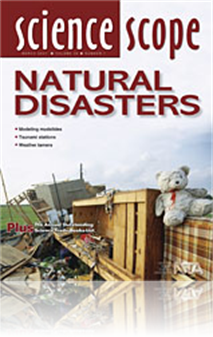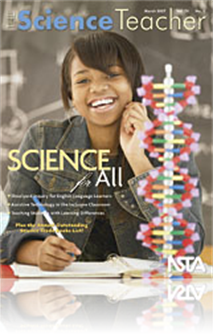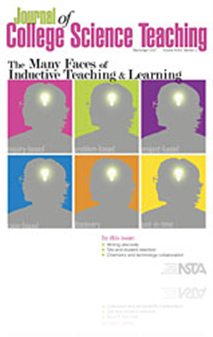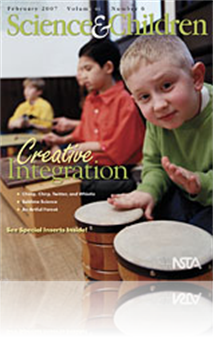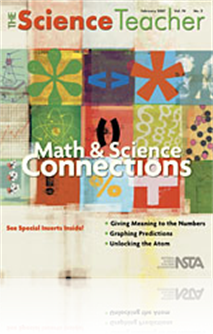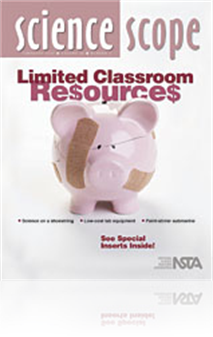All Resources
Journal Article
Encouraging Balanced Scientific Research Through Formal Debate
Having little or no background knowledge has never prevented seventh graders from having strong opinions on a subject! However, when asked to research a topic, middle school students (and also, many adults as well) tend to search for information whic...
Journal Article
Science Sampler: Studying storms to understand weather
Who isn’t awed by the power, beauty, and destructive capabilities of a hurricane, tornado, or snowstorm? Storms are one of those topics that nearly all students are interested in, and by capitalizing on this interest and focusing on the big idea be...
Journal Article
Teaching Science to Students with Learning Differences
Recent legislation, such as No Child Left Behind and the Individuals with Disabilities Education Act (IDEA) amendments of 1997 and 2004, emphasizes the importance of teaching students with mild disabilities in the general education classroom using th...
Journal Article
Collaborative Teaching Across Freshman Information Technology and Chemistry Courses
This article discusses a lesson in which chemistry was incorporated into information technology (IT) programming assignments and IT problem solving into chemistry. At-risk students, performing well below control groups of their peers in both courses,...
Journal Article
Service learning is a pedagogy that has the potential to connect young adolescents with their community in authentic situations where they can initiate projects that address real needs. The use of the “community” as a context for service and lear...
Journal Article
Research and Teaching: Web-Based Student Writing and Reviewing in a Large Lecture Course
Though difficult to implement in large courses, undergraduate science writing and peer review are valuable learning experiences for students and valid mechanisms for student evaluation. This study describes improved writing and reviewing skills of st...
Journal Article
Teaching through Trade Books: If You Build It...
From the youngest ages children construct buildings, bridges, towers, and anything else that comes to mind using a variety of materials. This month’s books and activities take this interest in construction and build on it by allowing students to ...
Journal Article
Teaching Through Trade Books: Science Measures Up
Can you measure a dog’s tail in dog biscuits? Can you measure a desk without a ruler? Which is better: measuring a room in paces or meters? Which system of measurement do scientists use? This month’s column explores these questions and more to he...
Journal Article
Ask the Experts – February 2007
In this month’s Ask the Experts column, the Experts address the following two questions: Does the Heisenberg Uncertainty principle serve as the basis for Chaos theory? and Why doesn’t the United States use the metric system, also known as the Sys...
Journal Article
Science Sampler: Frog dissection—An alternative model
Local dollar stores can be a treasure-trove of inexpensive items that are ideal for hands-on activities in the science classroom. This article describes one such activity in which a model frog that costs less than a dollar was used to allow students ...
Journal Article
Every Day Science Calendar: February 2007
This monthly feature contains facts and challenges for the science explorer. ...
Journal Article
Methods and Strategies: Alternative Assessments for English Language Learners
English Language Learners (ELL) are capable of high levels of conceptual understanding related to science. However, traditional means of assessment do not typically reflect their understanding of science content. We found through classroom observatio...
Journal Article
The Station Approach: How to Teach With Limited Resources
The Station Approach is a method of instruction in which small groups of students move through a series of learning centers, or stations, allowing teachers with limited resources to differentiate instruction by incorporating students’ needs, intere...
Journal Article
A group of kindergarteners and fellow first graders turned one school hallway into a forest as they endeavored to learn about animals and science inquiry. Not just any mural, this culmination of a month-long project was based on observing, questionin...
Journal Article
Issues In-depth: Inside the rainforests of the sea—Coral reefs and their endangerment
For a science teacher, studying coral and coral reefs provides an opportunity to present numerous scientific concepts in an integrated manner. The concepts of radial symmetry, biodiversity, symbiosis, interdependence, endangerment, and climate change...



